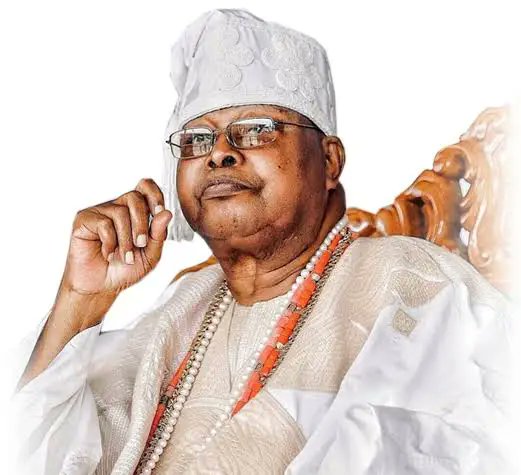By Sola Ojewusi
When the story of modern Yoruba royalty is told, one name shall tower like the Obanta hills of Ijebu — Oba Sikiru Kayode Adetona, the Awujale of Ijebuland, who reigned for an extraordinary sixty-four years, defying the erosion of time, resisting the shadows of irrelevance, and embracing the fire of Renaissance. His passing marks not just the end of a reign, but the closing of a chapter in Nigerian royalty that was as rich in wisdom as it was in cultural grandeur.
He ascended the throne in 1960, the year Nigeria claimed her independence — an omen, perhaps, that his destiny was to intertwine with the nation’s own unfolding drama. Barely 26 years old, he was not merely a young king; he was a visionary prince of purpose, a monarch who would come to embody the possibilities of a modern African royalty that did not wait to be served, but chose to serve.
Under his reign, Ijebu-Ode became a beacon, not just of cultural pride, but of intellectual dignity, political awareness, and infrastructural awakening. He inherited a stool of traditional reverence but reimagined it as a vehicle for diplomacy, progress, and statecraft. Kings before him ruled from palaces; he ruled from the crossroads of culture and development.
But nowhere was this spirit more visible than in his singular globalizing of culture through the majestic Ojude Oba festival. Once a communal homage rooted in Islamic devotion, Oba Adetona transformed it into a global spectacle of culture, colour, commerce, and communion. In his hands, Ojude Oba became an emblem of Yoruba aesthetics and pride, a stage where history danced in embroidered agbadas, where ancestral honour galloped in jewel-studded horses, and where the diaspora reconnected with its sacred soil. Under his vision, it rose from a town square ritual to an international brand of cultural excellence.
The Awujale was no mere figurehead. He was a royal intellectual, a monarch as comfortable quoting the constitution as he was chanting Yoruba oríkì. He navigated complex terrains—political instability, military juntas, cultural clashes, and economic changes—with a grace and steel that few leaders, royal or otherwise, could muster. He never hid behind the veil of tradition. He engaged, he questioned, he led.
Few will forget his defining clash in 1983 with the late Governor Bisi Onabanjo, a moment that tested the limits of royal power in a modern democracy. Accused and nearly dethroned, the Awujale stood firm. It was not simply a battle of personalities; it was a confrontation between transient politics and eternal heritage. And he won—not just in court, but in the court of public memory. His victory preserved not only his own throne but the dignity of Yoruba royalty in a republic increasingly suspicious of the traditional order.
In the soundscape of Nigerian music, his name was an instrument. From Ebenezer Obey to Sunny Ade, Ayinde Barrister to K1 De Ultimate, the Awujale’s name resounded like a royal gong. They sang not just of his stature, but of his substance—his boldness, his incorruptibility, his refined tastes, his profound Yoruba worldview. His palace was open to artists and thinkers, and his praise was currency in the highest circles of highlife, juju, and fuji. To be eulogized by so many musical titans is no accident—it is testimony.
And yet, beneath the layers of grandeur and public visibility, was a man obsessed with excellence and discipline. He modernized the Ijebu traditional council, invested in education, healthcare, and the documentation of history. He was perhaps the most accessible monarch in Yorubaland, yet he demanded standards. He was revered, but never afraid to be challenged. His monarchy was not ornamental—it was operational.
Across Nigeria, the Awujale extended his influence—making peace among feuding monarchs, bridging chasms between ethnic elites, mentoring governors and advising presidents. He believed that royalty must be custodial, not complacent; ethical, not ceremonial.
Now, the lion sleeps. The palace of Ijebu-Ode will never echo his deliberate footfalls again. Yet his essence will remain in every beaded crown worn with purpose, in every cultural festival reclaimed from obscurity, in every young Yoruba child who speaks their mother tongue with pride, in every diplomatic hand extended between tradition and progress.
Oba Sikiru Kayode Adetona’s reign was not merely long. It was luminous. It was a living archive of dignity, defiance, and destiny. He did not just wear the crown—he redefined what it meant. In his departure, he joins the ancestors, not as a relic, but as a compass for future monarchs, a royal standard that may never again be equaled.
Kabiyesi, sleep in splendour. Yours was not a reign; it was a renaissance. Ijebu has lost a father. Yorubaland has lost a crown. Nigeria has lost a living bridge between history and hope.
When the king is present, even the gods show restraint. With the Awujale’s departure, we know what power we once had in our midst. May his soul find eternal peace in the royal chambers of heaven.

